Some people are Outlander book purists; others swear by the show. Here are 4 reasons why you should read the Outlander books and watch the Outlander TV series.
As a book reader first and multiple time Outlander re-reader, I came to Outlander the TV show intellectually understanding the show would have to be something different. They are different mediums after all. They should be different. And, as book readers know, the showrunners and writers took that option to new lengths in Outlander Seasons 3 and 4, keeping Murtagh alive, a butterfly effect that will affect the TV show for the rest of its run. And that’s just one not-so-small example.
But what I’ve realized four seasons into the Outlander TV series in ways that I never imagined possible is how enjoying both mediums is actually the way to go for the ultimate Outlander experience. Now I know some people just don’t read. I don’t understand it, but I accept it. These people need or prefer to see it — whatever it is — to enjoy it. Conversely, I know some people hang onto a book version of anything like a dog with a juicy bone; nothing other than that bone will do. Do not even try to hand them a dog biscuit.
But I’m going to give it a shot anyway and offer up some reasons why if you’ve stayed strong and hard to your one lane, you might consider taking a drive on the other side. Droughtlander is going to be here for a very long time, my friends, so why not try something new? Here are 4 reasons you should consider putting aside your previous thoughts and try whatever option — books or Outlander TV show — you’ve heretofore rejected. I can guarantee you won’t be sorry. (As an aside, I want to point out that audio books also count as reading and the Outlander series is read by reading genius, Davina Porter, so that’s another option if picking up a book hundreds of pages long gives you pause.)
Caveat: I’m not going to get into a spitting match on which is better written. The TV show writers are almost universally good at their craft while Diana Gabaldon is, well, Diana Gabaldon. So this is not about which is better written. We’re all just going to take that as a given.
Pacing
If you’ve felt a little like you’re in a whirlwind that might even morph into a mini-tornado as each TV season has continued, here’s a reason to consider adding the books to your to-do list: they are slower. With each hundreds and hundreds of pages long — Outlander is 640 while The Fiery Cross is 990, for instance — the books can take dozens and dozens of pages for details that whirl by in the TV show. And that means room for more nuances. Some TV viewers, for instance, found the slavery issue in Outlander Season 4 frustratingly shallow. In the book, a much longer storyline occurs that provides depth and expands character development. I get why the TV version couldn’t really go there given allll the information that had to occur to have the story make sense, but if you want more and you want it slower, if you want background and historical details that just can’t be found in a 13-episode season, crack open the books.
Character Development
I personally, so far anyway, dislike TV Roger and TV Bree, both as a couple and as individuals. The details the TV show has chosen to focus on for their storyline make them seem, for the most part, like spoiled brats. In the books, they are both more complex. Book Roger is more multi-dimensional. His choices are more clearly agonizing about going back to Bree. He is honorable in ways that don’t come across in the show. The list could go on. Bree, meanwhile, actually has emotions beyond whining and complaining. This couple alone is a reason to give the books a chance because — spoiler alert — they’re going to take up more story real estate as this series continues. In other words, TV Roger and Bree may never live up to the book characters. Reading the books may make that more bearable for you, just sayin’.
But while the TV show has made some choices that work against the book characters, the producers have also made some wonderful additions and changes that have brought the series as a whole alive in ways I never imagined and have made my re-reads more enjoyable. Take Rupert and Angus. In the book, they are bit players. I’m not sure Gabaldon devotes even a page’s worth of words to either one of them, much less as a couple. In the show, they are wonderful comic relief, acting as foils to Claire as she tries to escape and to Jamie. They add depth to some of the series’ themes, such as loyalty. Rupert, who is allowed to live rather than be killed as happens in the book, has that wonderful death bed scene with Jamie after Culloden. Now when I re-read the book, I see them with more understanding and value.
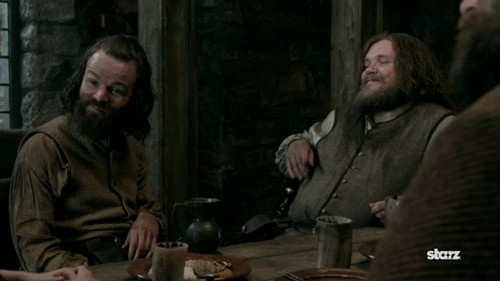
And then there’s Murtagh. TV Murtagh is a much more developed character. As such he brings more depth to understanding Jamie that we don’t see in the same way in the books. The godfather relationship shows Jamie’s capacity to love and also it informs his decision-making in the show. That complexity is only going to be further enhanced in Outlander Season 5 as Jamie and Murtagh are clearly going to be tested. Having made Murtagh the de facto head of the regulators (rather than how it plays out in the book), the producers have ensured that the line Jamie was going to have to walk anyway when he agreed to Gov. Tryon’s land pact becomes, as decisions often do, one about love and family. Beyond the fact that we all love Murtagh and Duncan Lacroix, the actor who brought him to life, this development as a tool to create TV tension is brilliant even as it’s wildly different from the books.
TV Murtagh also enhances Claire’s character as we see their relationship develop in the show in ways not seen in the books. “The Search” in Season 1 is a notable example. Whether that episode is near the bottom of your list of episode favorites aside, we do see and understand Claire in ways that we might not just from the reading the book. Besides, Murtagh gives the best hugs.
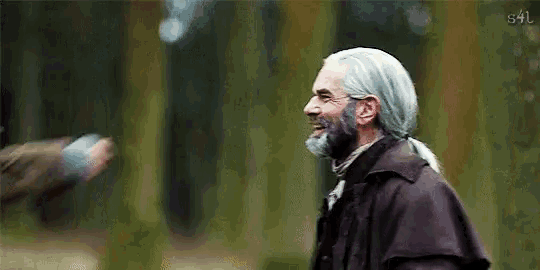
One final example occurs earlier in the series, when the show introduces the idea of Claire and post-traumatic stress disorder (PTSD), something that’s not in the books at all. When it first happened, I wasn’t sure it was the right step. But then as that subtext continued, I thought, this is brilliant. Of course she would have a PTSD reaction as the impending stress of Culloden and the increasingly obvious future that they were not going to be able to stop this horrendous battle. It brought more to her character and made me read the books differently after seeing that part of the show.
Scotland
I don’t know how good your imagination is, but I realized the inadequacy of mine when I actually saw Scotland in the show. I thought I had a general sense of this beautiful country and its people as I read the books. Nope. Not even close. Scotland is a visual feast and, thanks to the show, I now have a new appreciation for how this rugged country impacts the characters themselves and can now read the books with that visual backdrop. Result? My read is even more pleasurable now that I watched the show. Didn’t even think that could be a thing.
Conversely, if you want to luxuriate in the ways of the people with more historical tidbits, head to the books. Result? You’ve got the best of both worlds.
Sex and Intimacy
If you’ve only watched the show, you know full well how the sex and intimacy between Jamie and Claire has dwindled ever since Outlander Season 1. And if you follow any social media at all, you have likely heard book readers complain long and loud. Why? Because they know what’s missing. They know sex and intimacy are as critical to Jamie and Claire’s relationship and to whom they are as an individuals as breathing.
Which is not to belittle the sex we do see in the show. Dear God these two humans are beautiful individually and as a couple. The chemistry between Sam Heughan and Caitriona Balfe is unicorn-like. We could not ask for a better couple to bring Gabaldon’s words to life.
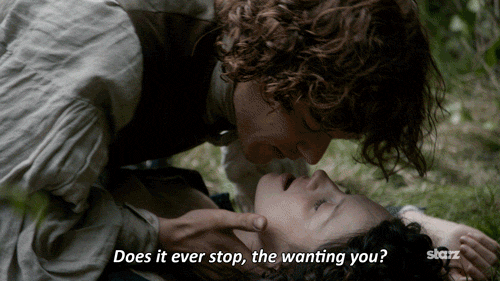
But they can only make their magic when they are given scenes and with whatever words they are provided. And the bottom line of the show is, due to a chock-full, complicated storyline, there just isn’t that much time. Nor is that likely to change as we enter the American Revolution and all that’s coming.
So if you want more intimacy, consider adding the books to your life. If you head over to the books, for instance, you can read the amazing scene with Jamie and Claire in the grotto at the end of Outlander (a scene that leaves you no doubt these two are well on the way to recovery as a couple). Now I get the logic of why they couldn’t recreate that amazingly expensive scene for TV. But the TV producers took it a step further and decided in Outlander Season 2 to make Jamie and Claire more at odds than they are in the books. That was a mistake IMO. It wasn’t just about the lack of sex. It was about how their coupledom was not at the center of the second season. While Jamie and Claire had moments of difference, in the books there is no doubt they are working together. The show went a different route. The good news is after bitching about it (and choosing to only rewatch that season in its entirety once because I found it so irritating) I can instead go back to the source and my happy place. And that means I can stop being as irritated at the show. This is a good thing.
And finally one more reason to consider the books: Diana Gabaldon is hands down the best writer of sex scenes ever. Think I’m kidding? Here’s snippet from Drums of Autumn that did not make it to the screen: the riverbank scene. Jamie and Claire have agreed to meet by the water for a little rendezvous after days of traveling in a group. Claire is getting impatient and starts to take care of herself:
A breath of warm breeze slipped past me, and all the tiny down hairs on my body prickled with its passing. No hurry now, and no one to hear. I drew a hand down the soft curve of my belly and the softer skin inside my thighs, where the blood pulsed slowly to the beat of my heart. I cupped my hand, feeling the swollen moist ache of urgent desire.
I closed my eyes, rubbing lightly, enjoying the feeling of increasing urgency.
“And where the hell are you, Jamie Fraser?” I murmured.
“Here,” came a husky answer.
Startled, my eyes popped open. He was standing in the stream, six feet away, thigh-deep in the water, his genitals stiff and dark against the pallid glow of his body. His hair lay loose around his shoulders, framing a face white as bone, eyes unblinking and intent as those of the wolf-dog. Utter wildness, utter stillness.
Then he stirred and came toward me, still intent, but still no longer. His thighs were cold as water when he touched me, but within seconds he warmed and grew hot. Sweat sprang up at once where his hands touched my skin, and a flush of hot moisture dampened my breasts once more, making them round and slick against the hardness of his chest.
Then his mouth moved to mine and I melted—almost literally—into him. I didn’t care how hot it was, or whether the dampness on my skin was my sweat or his. Even the clouds of insects faded into insignificance. I raised my hips and he slid home, slick and solid, the last faint coolness of him quenched by my heat, like the cold metal of a sword, slaked in hot blood.
My hands glided on a film of moisture over the curves of his back, and my breasts wobbled against his chest, a rivulet trickling between them to oil the friction of belly and thigh.
“Christ your mouth is slick and salty as your quim,” he murmured, and his tongue started out to taste the tiny beads of salt on my face, butterfly wings on temple and eyelids.
I was vaguely conscious of the hard rock under me. The stored heat of the day rose up and through me, and the rough surface scraped my back and buttocks, but I didn’t care.
”I can’t wait,” he said, breathless.
“Don’t,” I said and wrapped my legs tight around his hips, flesh bonded to flesh in the brief madness of dissolution…
This goes on in various stages, including intimate conversation, for FOUR MORE PAGES until it ends with “then the fiery sword severed me from consciousness and set fire to my body. We blazed up together, bright as stars in the summer night, and then sank back burnt and limbless, ashes dissolved in a primordial sea of warm salt, stirring with the nascent throbbings of life.”
Tony Graphia and Maril Davis, both avid book fans, said they were sorry they couldn’t get that into Outlander Season 4. No worries, say I. I’ve got the book—and the show.
Do you agree? Do you think reading the books and watching the show is the way to get the full Outlander experience?
Or do you still prefer to stick to reading or watching?


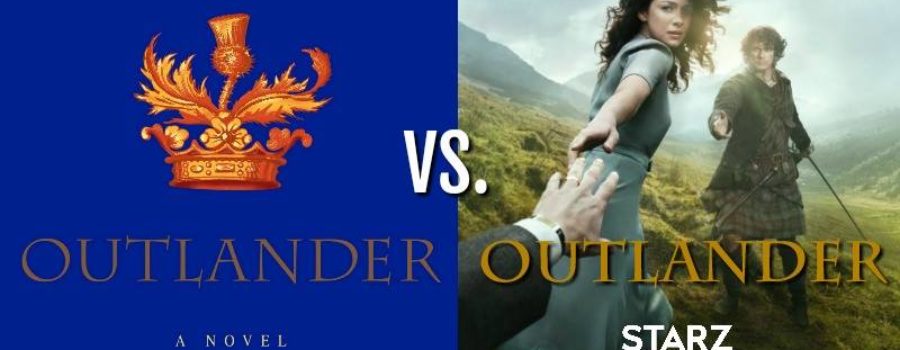



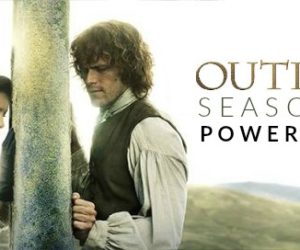
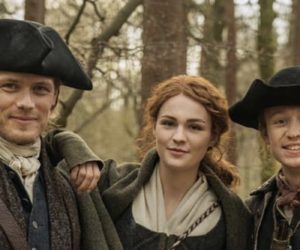
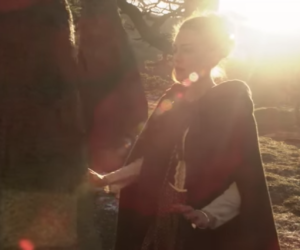
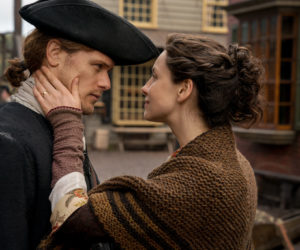





38 Comments
Leave your reply.